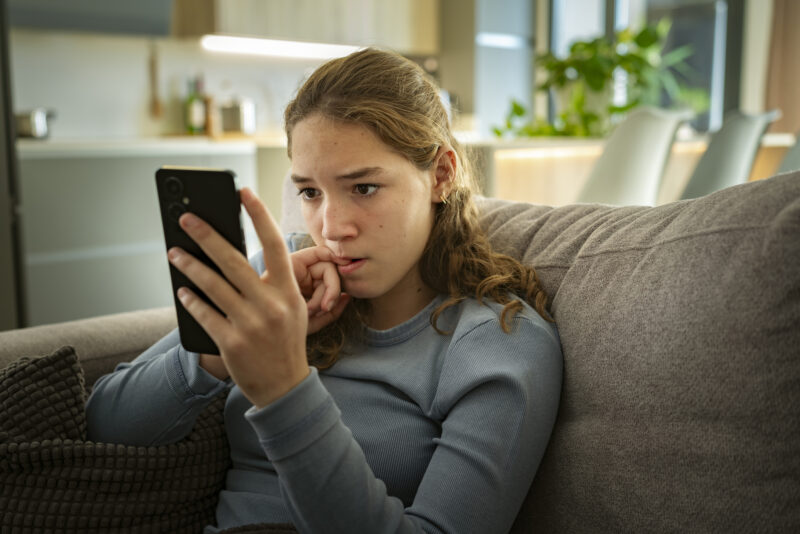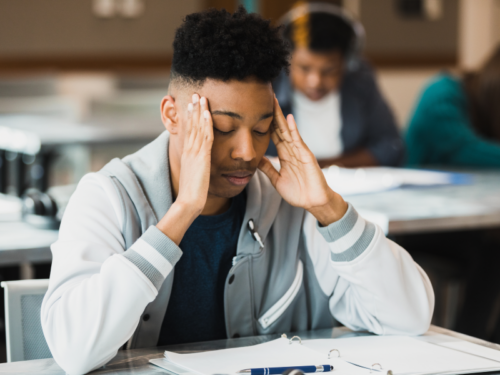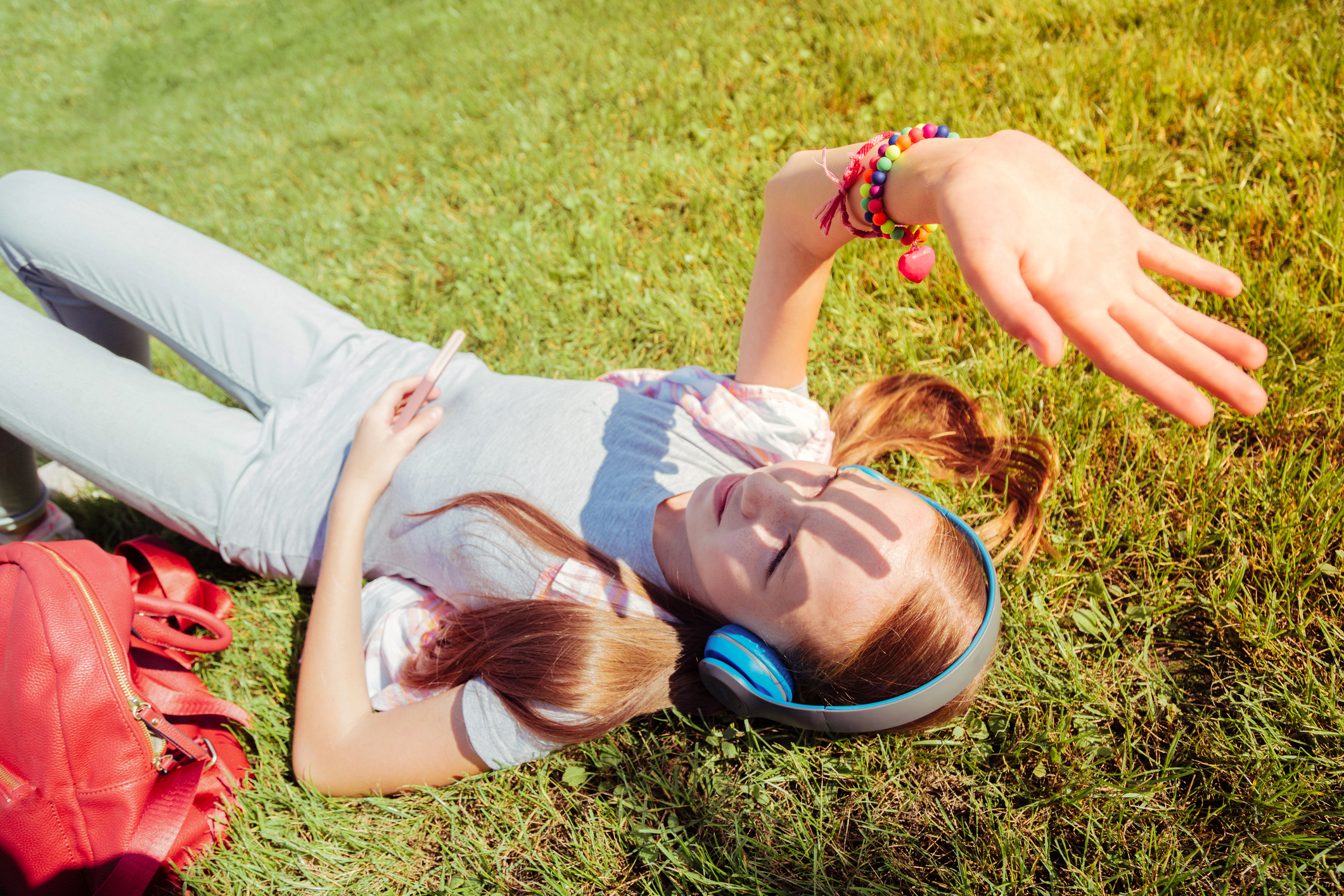
Table of Contents
How to Help a Child With School-Related Anxiety, According to Therapists

Written By: Ashley Laderer

Clinically Reviewed By: Austin Chason
August 6, 2025
7 min.
Read on to learn the signs of school anxiety in children and tips for how to help.
Learn more about our Clinical Review Process
Table of Contents
Does your child frequently complain of stomachaches before school starts? Or, do they have trouble falling asleep and start to cry when school is brought up? If so, your child is likely dealing with anxiety about school. Some nervousness about school is normal — but ongoing fear that interferes with your child’s daily life or school refusal may signal something deeper that needs attention.
Addressing school anxiety is crucial for the child’s overall well-being and performance at school. “Anxiety can impact a child’s ability to concentrate while at school, their ability to complete their school work at home or at school, test performance, grades, and ability to make or keep friends,” says Alysson Thewes, LCSW, a Charlie Health Primary Therapist. Keep reading to learn about how to help a child with anxiety about school, plus four actionable coping skills to teach them.

Anxiety treatment for kids and teens
Virtual, intensive treatment that fits into your child’s school schedule.
How to help a child with anxiety about school
As a parent, you want to do what’s best for your child and help them to the best of your ability. However, knowing how to help an anxious child isn’t always easy. Here are six practical steps you can take to support your child’s mental health and help them deal with school anxiety.
1. Understand the signs of school anxiety
First, it’s crucial to understand the signs of school anxiety and how this type of anxiety can manifest, since anxiety can show up differently in kids than in adults. Thewes says some telltale signs of school anxiety include:
- Crying when school is brought up
- Saying they’re worried about schoolwork, teachers, or being at school
- Stomachaches or headaches, especially before school
- Trouble sleeping on school nights
- Frequently asking or demanding to stay home from school (also known as school avoidance or school refusal)
However, signs of anxiety can differ from kid to kid. You know your child best, and you should look out for any behavior that’s out of the norm.
2. Know how to communicate effectively
Open, honest communication is key. It’s likely your child may be nervous about opening up, and they might even be confused about what they’re feeling. You want to make sure you let your child know that it’s safe to talk to you about anything and everything.
“It’s important that your anxious child feels it is okay to feel his or her feelings,” Thewes says. “Listen to them and their concerns without judgment. If they are having a hard time talking about what they’re feeling, help them figure out what it is they are feeling or thinking.”
3. Be on their team
Let your child know that you’re on their side and you’re on this journey with them to help. “If your child knows that you care about what they are feeling, and want to help them address the feelings and solve the issue, that is a huge piece of the puzzle,” Thewes says. “When a child feels misunderstood or judged, any given issue is likely to get worse.”
You can show them that you’re on their team by validating their feelings and celebrating small victories in overcoming anxiety and facing fears.

4. Build routines at home
Routines can help lessen anxiety for some kids. For example, you might establish a predictable, calm morning routine before school starts, says Chris Hinton, LPC, a Group Facilitator at Charlie Health. “This can help reduce anxiety by creating a sense of control and predictability,” she explains. “Consistency helps because predictable routines help lower stress by reducing uncertainty, a big trigger for anxious kids.”
You can also consider creating calming bedtime routines to help them wind down on school nights when they might be worried about the next day.
5. Work together with the school
Work together with your child (and potentially with the school) to solve the issue at school. Thewes recommends asking yourself, “Is it bullying? A learning disability? Immense difficulty in a certain subject or subjects? Challenges with making friends?”
Teachers, school counselors, and administrators can help you address these challenges. By sharing your child’s struggles with them, you can work together to create a supportive plan.
Additionally, the law requires schools to provide accommodations to students with anxiety disorders under the Individuals with Disabilities Education Act (IDEA). Students with diagnoses of generalized anxiety disorder or social anxiety disorder can get an Individualized Education Plan (IEP) that can help provide anxiety-relieving accommodations.
6. Know when to seek professional help
“If your child is regularly refusing to go to school, avoiding social situations, or unable to participate in activities they used to enjoy, that’s a red flag,” Hinton says. These are signs that your kid could benefit from some professional mental health support.
Additionally, if your child often complains of physical symptoms like headaches, stomachaches, and nausea, this is a cause for concern. “If their symptoms are frequent and the doctor finds no physical cause, anxiety could be the underlying issue,” Hinton says.
Lastly, she suggests looking out for frequent meltdowns, irritability, crying spells, and panic attacks, especially if the behaviors and reactions are out of proportion to the situation. “This may indicate that your child’s nervous system is overwhelmed and could be a sign of anxiety,” says Hinton.
A child or adolescent therapist can help your child work through their anxiety, learn coping strategies, and process their fears in a safe environment. Additionally, in situations of severe anxiety, medication can help. A therapist might refer your child to see a child/adolescent psychiatrist who can assess whether medication is the right fit.
Coping skills for children with school anxiety
On top of the above tips, there are some coping skills your child can use for managing anxiety at home and at school.
1. Breathing exercises
Breathing exercises can help children ground themselves in the moment and lessen anxiety, Thewes says. An easy one for kids to remember is square breathing. You visualize a square, and each four-second stretch moves along one side of the square.
- Inhale for 4 seconds
- Hold for 4 seconds
- Exhale for 4 seconds
- Hold for 4 seconds
You and your child can do this for as little as a minute or two, or keep it up for longer — whatever it takes to get calmed down and focused on the present moment, she says.
You can also teach your child simple diaphragmatic breathing, also known as belly breathing. Anxiety often causes us to breathe shallowly, and belly breathing counteracts this. Teach your kid to place one hand on their chest and one on their belly, then take slow, deep breaths so that only the hand on their belly moves.
“Practice deep breathing together each day, especially during non-stressful times to build the habit,” Hinton recommends. Practicing this when not anxious will help your child access this tool more easily when they are feeling anxious.
2. Drawing the anxiety
“Parents can ask their children, when they are feeling anxious, to draw or paint their anxiety as a ‘worry monster,’” Thewes says. “This can then lead to talking further about their feelings through what they drew, to help their children express themselves.”
This art therapy exercise externalizes the anxiety, which can make it feel less overwhelming and easier for the child to discuss. It’s also helpful for younger children who aren’t able to fully understand and verbalize their emotions.
3. Positive affirmations
You can help your child choose and repeat positive affirmations that counteract their negative anxious thoughts, Thewes says. They can either say them out loud or in their head. Some ideas of affirmations include:
- “I’ve got this!”
- “I can do this!”
- “I am strong!”
- “I have made it through hard things before!”
4. Physical activity
Exercise is a proven way to lower stress and improve mental health in people of all ages. “Parents can model for their children how physical activity can often reduce our anxiety, by releasing endorphins and also by getting our mind off of the particular thing that is bothersome,” Thewes says. “Jogging, jumping rope, hopscotch, or walking the dog can all be easy, fun activities to reduce anxiety.” Find what’s enjoyable for your child and roll with it.

How Charlie Health can help
If a child in your life is struggling with anxiety, Charlie Health is here to help. Charlie Health’s virtual Intensive Outpatient Program (IOP) provides more than once-weekly mental health treatment for dealing with serious mental health conditions, including anxiety disorders like generalized anxiety disorder, panic disorder, and more. Our expert clinicians incorporate evidence-based therapies into individual counseling, family therapy, and group sessions. With treatment, managing your child’s well-being is possible. Fill out the form below or give us a call to start healing today.
References
https://adaa.org/learn-from-us/from-the-experts/blog-posts/consumer/back-school-anxiety-what-parents-and




